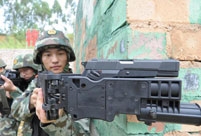 Vintage cars show kicks off in London
Vintage cars show kicks off in London
 Gorgeous scenery in NE China
Gorgeous scenery in NE China
 Picturesque Barkol grassland in Xinjiang
Picturesque Barkol grassland in Xinjiang
 Small Wild Goose Pagoda - A World Cultural Heritage Site along the Silk Road
Small Wild Goose Pagoda - A World Cultural Heritage Site along the Silk Road
 Maritime Silk Road Luxuries of the Han Dynasty
Maritime Silk Road Luxuries of the Han Dynasty
 Ciao! Chinese beauties!
Ciao! Chinese beauties!
 An eye feast: BFA freshmen registration
An eye feast: BFA freshmen registration
 Top 10 most lavish weddings
Top 10 most lavish weddings
 Most amazing chi-pao beauties
Most amazing chi-pao beauties
 Chinese lingerie brand arrives in Las Vegas
Chinese lingerie brand arrives in Las Vegas
Legal framework to aid fight against extremism: experts
China will punish people who verbally abuse or assault others they consider "heretics" or "religious traitors," say new national guidelines that provide the first clear legal definitions for crimes connected with terror activities.
The guidelines, issued by the Supreme People's Court, Supreme People's Procuratorate and the Ministry of Public Security, were published on September 9 and made public through their websites on Sunday.
They are meant to be used on a transitional basis before the country launches its first official counter-terrorism law at the end of this year or early next year.
According to the new guidelines, individuals assaulting others they consider "heathens" or "religious traitors" could be charged with "provocation" and punished accordingly.
Individuals who make false threats to hijack airplanes or set off explosions will be charged with the crime of fabrication and dissemination of false terrorist information.
The guidelines classify seven forms of behavior as criminal "organizing, leading, or participation in criminal groups," including training terrorists, spreading extremist ideologies to other members of the terror group, plotting, leading or conducting terrorist attacks, and producing weapons or terror-related materials.
Offences carry sentences ranging from 10 years to a life sentence.
Spreading religious extremism or terrorism through traditional media, Internet services such as blogs or instant messaging applications, portable devices or memorabilia are defined in the guidelines as "inciting secession."
Suspects convicted of serious related offenses can be sentenced to a minimum of five years in jail.
"Terrorist activities in China are diverse, but all tie back to religious extremism [in one form or another], and have caused severe damage to [the country's] national security, social stability, ethnic cohesion and people's livelihood," reads the document.
Experts believe that the documents will help counter-terrorism law enforcement target separatist movements in Northwest China's Xinjiang Uyghur Autonomous Region, and the "three evil forces" of terrorism, separatism and extremism, which have been on the rise in China in recent years.
A full-fledged counter-terrorism law is currently being formulated, and is expected to be released later this year or earlier next year, the Beijing-based Legal Mirror newspaper reported.
China launched a one-year nationwide campaign against terrorism in May following a series of violent and deadly attacks by terrorists and religious extremists, with Xinjiang being the main "battlefield."
"It will take time for the authorities to consult and deliberate before the introduction of an anti-terrorism law next year, so this set of guidelines will be used to fill the gap before a comprehensive legal framework enters into practice," Li Wei, an anti-terrorism expert with the China Institutes of Contemporary International Relations, told the Global Times.
"Since it is jointly released by top bodies like the Supreme People's Court and the Supreme People's Procuratorate, the guidelines will form a legally binding basis to crack down on terrorist activities for the time being," he noted.
Xinjiang has recently seen an increasing number of terrorism incidents related to religious extremism and separatist movements.
In late July, a fatal terrorist attack in Xinjiang's Shache left 37 civilians dead and another 13 injured, making it one of the largest attacks since riots involving multiple ethnic groups in July 2009. The group's leader was later found to be connected to the East Turkestan Islamic Movement, a terror organization.
"For years China has lacked an anti-terrorism law and clear definitions of terrorist activities," noted Li.
His points were echoed by Wang Guoxiang, an associate professor at the Beijing Academy of Social Sciences.
"Xinjiang's separatist movement and the 'three evil forces' have developed and changed quickly, while current law has failed to address the present situation," Wang told the Global Times.
Wang believes that an anti-terrorist law will help send a signal regarding China's stance on the country's separatist movements.
The anti-secession law, cited by Wang as an example, was originally meant to address Taiwan only, but has also been challenged in recent years as separatist movements in Xinjiang have worsened.
The new document also provides guidelines for division of roles and responsibilities for law enforcement in terrorism-related cases.
Investigations will be conducted by public security departments, which will in turn require approval by prosecutors of the same administrative ranking. Prosecutors will also be responsible for deliberating on and filing charges in cases connected with terrorism.
 Giant white gourd weighing 87 kilograms appears in SE China
Giant white gourd weighing 87 kilograms appears in SE China Advanced arms help to safeguard China-ASEAN Expo
Advanced arms help to safeguard China-ASEAN Expo Leading director Wang Quan'an detained for 'buying sex'
Leading director Wang Quan'an detained for 'buying sex' Heaven on earth: Dongjiang Lake in Hunan
Heaven on earth: Dongjiang Lake in Hunan Mixed reaction to smartphone sidewalk
Mixed reaction to smartphone sidewalk 'Rainbow running' race in Jiangxi
'Rainbow running' race in Jiangxi Amazing aerial photos of China's Xisha Islands
Amazing aerial photos of China's Xisha Islands Beautiful postgraduate teaches in remote area
Beautiful postgraduate teaches in remote area Top 10 world's highest-paid models 2014
Top 10 world's highest-paid models 2014 Lingerie show at 2014 Miss China
Lingerie show at 2014 Miss China Songstress Li Xianglan dies at 94
Songstress Li Xianglan dies at 94 Police recruiting posters
Police recruiting posters Anshun Daxi- Living fossil of Chinese drama
Anshun Daxi- Living fossil of Chinese drama Urban farmers in China
Urban farmers in China 'Firepower-2014 Weibei'military exercise
'Firepower-2014 Weibei'military exerciseDay|Week|Month